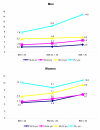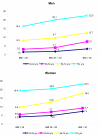Moderately overweight and obese patients in general practice: a population based survey
- PMID: 16827937
- PMCID: PMC1564048
- DOI: 10.1186/1471-2296-7-43
Moderately overweight and obese patients in general practice: a population based survey
Abstract
Background: Obesity is a main threat to public health in the Western world and is associated with diseases such as diabetes mellitus and coronary heart diseases. Up to now a minority of research studied the relation between obesity and the use of primary health care. In the Netherlands the general practitioner (GP) is the main primary health care provider. The objective of this article is to evaluate GP consultation and prescription of drugs in moderate and severely overweight (obese) persons in the Netherlands.
Methods: Data were used from a representative survey of morbidity in Dutch general practice in 2001. Our study sample consisted of 8,944 adult respondents (18+ years) who participated in an extensive health interview. Interview data were linked to morbidity and prescription registration data from 95 general practices where respondents were listed. Body mass index (BMI) was calculated using self-reported height and weight. Analyses were controlled for clustering within practices as well as for socio-demographic and life style characteristics.
Results: Obesity (BMI > or = 30 kg/m2) was observed in 8.9% of men and 12.4% of women; for moderate overweight (BMI 25-< 30 kg/m2) these percentages were 42.2% and 30.4% respectively. Obese men and women were more likely to consult their GP than persons without overweight. This especially holds for diseases of the endocrine system, the cardiovascular system, the musculoskeletal system, the gastro-intestinal system, and skin problems. Related to this, obese men and women were more likely to receive drugs for the cardiovascular system, the musculoskeletal system, alimentary tract and metabolism (including, for example, antidiabetics), and dermatologicals, but also antibiotics and drugs for the respiratory system. For moderately overweight men and women (BMI 25- < 30 kg/m2) smaller but significant differences were found for diseases of the endocrine system, the cardiovascular system, and the musculoskeletal system.
Conclusion: Obesity increases the workload of Dutch general practitioners and the use of prescribed medication. The current increase in the prevalence of obesity will further increase the use of health care and related costs. Since a large majority of Dutch persons visit their GP over the course of one year, GPs' potential role in effective prevention strategies cannot be denied.
Figures
Similar articles
-
The 25-year health care costs of women who remain overweight after 40 years of age.Am J Prev Med. 1996 Sep-Oct;12(5):388-94. Am J Prev Med. 1996. PMID: 8909650
-
Abdominal obesity, waist circumference and cardio-metabolic risk: awareness among primary care physicians, the general population and patients at risk--the Shape of the Nations survey.Curr Med Res Opin. 2007 Jan;23(1):29-47. doi: 10.1185/030079906X159489. Curr Med Res Opin. 2007. PMID: 17261236
-
Body mass index and waist circumference predict both 10-year nonfatal and fatal cardiovascular disease risk: study conducted in 20,000 Dutch men and women aged 20-65 years.Eur J Cardiovasc Prev Rehabil. 2009 Dec;16(6):729-34. doi: 10.1097/HJR.0b013e328331dfc0. Eur J Cardiovasc Prev Rehabil. 2009. PMID: 19809330
-
Economic costs of overweight and obesity.Best Pract Res Clin Endocrinol Metab. 2013 Apr;27(2):105-15. doi: 10.1016/j.beem.2013.01.002. Epub 2013 Feb 28. Best Pract Res Clin Endocrinol Metab. 2013. PMID: 23731873 Review.
-
Prevalence of overweight and obesity in The Netherlands in relation to sociodemographic variables, lifestyle and eating behavior: starting points for the prevention and treatment of obesity.Bibl Nutr Dieta. 1989;(44):8-21. doi: 10.1159/000417295. Bibl Nutr Dieta. 1989. PMID: 2675827 Review.
Cited by
-
Dutch General Practitioners' weight management policy for overweight and obese patients.BMC Obes. 2014 Feb 19;1:2. doi: 10.1186/2052-9538-1-2. eCollection 2014. BMC Obes. 2014. PMID: 26217495 Free PMC article.
-
Obesity management and continuing medical education in primary care: results of a Swiss survey.BMC Fam Pract. 2011 Dec 22;12:140. doi: 10.1186/1471-2296-12-140. BMC Fam Pract. 2011. PMID: 22192159 Free PMC article.
-
Lifestyle counseling in hypertension-related visits--analysis of video-taped general practice visits.BMC Fam Pract. 2008 Oct 14;9:58. doi: 10.1186/1471-2296-9-58. BMC Fam Pract. 2008. PMID: 18854020 Free PMC article.
-
Prevalence of obesity in primary care using different anthropometric measures--results of the German Metabolic and Cardiovascular Risk Project (GEMCAS).BMC Public Health. 2008 Aug 11;8:282. doi: 10.1186/1471-2458-8-282. BMC Public Health. 2008. PMID: 18694486 Free PMC article.
-
The Impact of Severe Obesity on Healthcare Resource Utilisation in Spain.Obes Surg. 2017 Aug;27(8):2058-2066. doi: 10.1007/s11695-017-2596-7. Obes Surg. 2017. PMID: 28261758
References
-
- James PT, Leach R, Kalamara E, Shayeghi M. The worldwide obesity epidemic. Obes Res. 2001. pp. 228S–233S. - PubMed
-
- Nikogosian H. Counteracting obesity – a public health threat in the WHO European Region. In: Tellnes G, editor. Urbanisation and health New challenges in health promotion and prevention. Oslo, Oslo Academic Press; 2005. pp. 69–76.
-
- Seidell JC. Obesity, insulin resistance and diabetes – a worldwide epidemic. Br J Nutr. 2000. pp. S5–8. - PubMed
Publication types
MeSH terms
LinkOut - more resources
Full Text Sources
Medical




